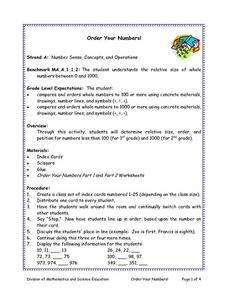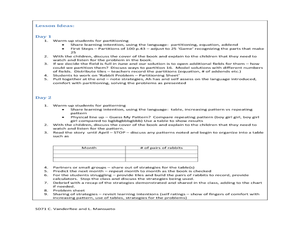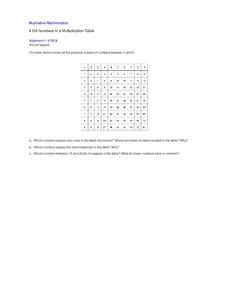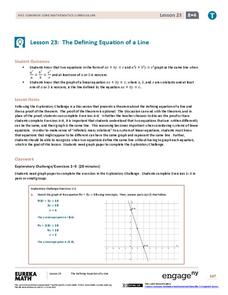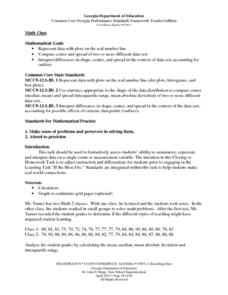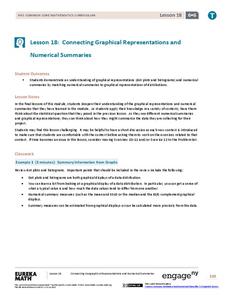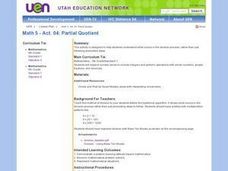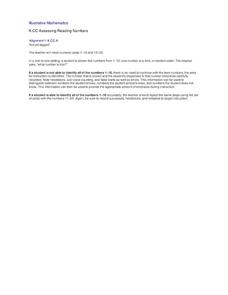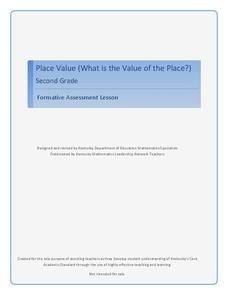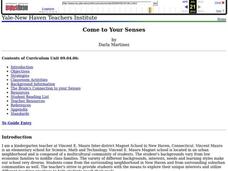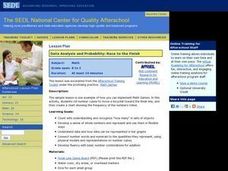Curated OER
Is Your Order Up or Down?
Students practice ordering numbers. In this number sense lesson, students collaborate to order whole numbers from greatest to least and least to greatest. Students also practice the concept by using educational software.
Curated OER
Order Your Numbers
Students examine the order of whole numbers that range from 0 to 1,000. They compare and contrast the quantities of different numbers using the number line, objects, and symbols of comparison. Students also work as a class with cards to...
Curated OER
Function Tables
Fourth graders explore the concept of function tables. In this function tables instructional activity, 4th graders compare the star machine in The Sneeches to function tables in math. Students practice creating and solving function tables.
Curated OER
The Rabbit Problem
Students notice a number pattern in the book The Rabbit Problem by Emily Gravett. In this number pattern lesson, students represent and describe numbers appropriate to their grade level.
August House
The Stolen Smell
Some smells are better than others! Explore your sense of smell with a series of activities based on the Peruvian folktale, The Stolen Smell. With exercises about phonics, counting, cooking, art, and drama, the lesson is a...
Curated OER
Integrating Gandhian Principles of Communal Unity in Mathematics
Fourth through sixth graders incorporate Gandhian principles into Math curriculum. They explore Gandhi's teachings on communal unity and economic equality. This has quite a bit of information about Gandhi and his observations and...
Illustrative Mathematics
Numbers in a Multiplication Table
Identifying patterns is a crucial skill for all mathematicians, young and old. Explore the multiplication table with your class, using patterns and symmetry to teach about square numbers, prime numbers, and the commutative and identity...
EngageNY
The Defining Equation of a Line
They appear to be different, yet they are the same line. Part 24 out of 33 lessons provides a theorem about the relationships of coefficients of equivalent linear equations. Pupils use the theorem to determine whether two equations are...
Georgia Department of Education
Math Class
Young analysts use real (provided) data from a class's test scores to practice using statistical tools. Not only do learners calculate measures of center and spread (including mean, median, deviation, and IQ range), but...
EngageNY
Connecting Graphical Representations and Numerical Summaries
Which graph belongs to which summary statistics? Class members build upon their knowledge of data displays and numerical summaries to connect the two. Pupils make connections between different graphical displays of the same data in...
Curated OER
Tens and Ones Fun
Youngsters use their large motor skills to build numbers to 20 in this outdoor, kinesthetic, collaborative activity. Amass cardboard boxes for groups to stack, sort, and bundle into 10s and 1s to show numbers and place value. They'll...
Curated OER
Fractions, Decimals, and Percentages Got You Down? "Tri" This!
Students explore number sense by creating a math presentation in class. In this parts of a whole lesson, students define and discuss the relationship between fractions, decimals and percentages before completing a problem worksheet in...
Virginia Department of Education
Scientific Notation
Writing a number is all in the notation. The resource introduces the class to scientific notation. Pupils learn the process of taking a very large or small number in standard form and write it in scientific notation. To practice,...
Virginia Department of Education
Absolute Value
Your birthday can be more than just about presents; it can even teach about absolute value. The class investigates absolute value as the distance from zero on a number line. Plotting birth months and comparing each birth month to July...
Illustrative Mathematics
Sort and Count II
Capture the engagement of young mathematicians with this hands-on sorting activity. Given a bag of objects, students work independently sorting the items based on their physical attributes, counting to determine the size of each group....
Curated OER
Partial Quotient
Students study what occurs in the division process, rather than just following prescribed steps. They expand number sense to include integers and perform operations with whole numbers, simple fractions, and decimals. They write a word...
Illustrative Mathematics
Making a Clock
Have a fun time teaching children to read analog clocks with this whole-group math activity. Using large sets of the numerals 1-12 and 0, 5, 10...55, the teacher creates a large clock on either the carpet or the white board, explaining...
Illustrative Mathematics
Assessing Reading Numbers
Youngsters develop their number sense by rote counting from one to ten. Over time, they identify the numbers on their own and no longer rely on fixed recitation. Using numerical flashcards, a teacher will randomly choose numbers from the...
Curated OER
Place Value - What Is the Value of the Place?
Second graders build number sense in an activity that requires the matching of base 10 representations to numbers. It is the teachers responsibility to gauge student understanding and involvement while class members work in groups.
Curated OER
Applied Science - Science and Math Lab
Students explore the senses. In this Applied Science lesson, students investigate the items in "feely" boxes with their hands, both touching the items and shaking the boxes to hear the sound the items make. Students also smell and taste...
Alabama Learning Exchange
The Five Senses: How They Relate to our World
Young scholars explore the five senses and the significance of each sense. In this five senses and diversity lesson, students listen to You Can't Smell a Flower With Your Ear by Joanna Cole and take a walk observing opportunities to use...
Curated OER
Come to Your Senses
Students explore their senses. In this biology lesson plan, students will learn about their senses, what affects them, and how the brain works to control our senses in a series of lab activities.
Curated OER
Data Analysis and Probability Race to the Finish
Students practice addition facts, record data, and construct a bar graph. In this probability lesson, students participate in a board game in which bicycles move towards a finish line based on players completing addition problems. Dice...
Curated OER
Six of One, Half Dozen of the Other
Students explore the garden with all five senses. In this Science lesson, students collect specimens from the garden to classify. Students use adjectives to describe the objects collected.
Other popular searches
- Everyday Math Number Sense
- Five Senses Math
- Math Number Sense Activities
- Preschool Five Senses Math
- Math Number Sense Review
- Math Number Sense Lessons
- Five Senses Math Lesson
- Number Sense Math
- Basic Math Number Sense
- Grade 6 Math Number Sense

